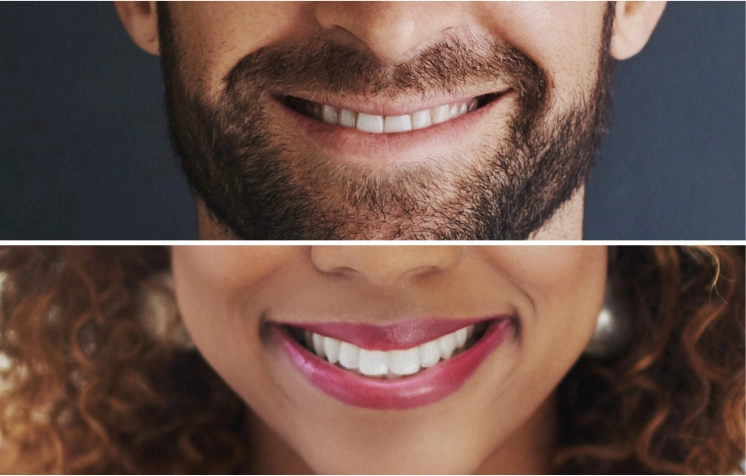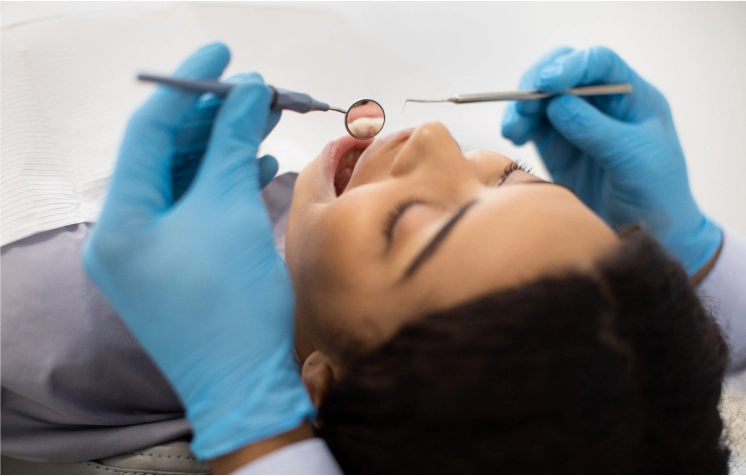
Teeth Whitening in Philadelphia
Can't Call Us?
Feel free to fill out this form and we'll reach out to you.
The presence of discolored or yellowed teeth can significantly impact one’s self-esteem and may lead to feelings of discomfort, affecting overall confidence. At Absolute Smile, our goal is to help you regain that confidence by providing professional teeth whitening services in Philadelphia.
Professional teeth whitening or in-office whitening is a cosmetic dental procedure that involves the use of bleaching agents to lighten the color of your teeth, resulting in whiter teeth. This helps you achieve a more radiant and attractive appearance, making you feel more comfortable and confident in social situations.
Is Professional Teeth Whitening for You?
Teeth whitening is not something everyone should use. When you visit us, we will provide an examination to ensure your teeth are healthy enough for this procedure. We will then work closely with you to choose the proper method for your case. Many times, teeth bleaching methods work well to remove stains and discoloration, but they do not work to resolve cavities or gum problems. We need to address those concerns first in most cases.

Who Is Not an Ideal Candidate for Teeth Whitening?
Here's what we look out for to determine if you are eligible for in-office teeth whitening:
- Teeth sensitivity. Some may experience severe sensitivity from tooth whitening procedures. This can be exacerbated by the use of bleaching agents, making it an uncomfortable and potentially harmful procedure for those with sensitive teeth.
- Gum Disease. People with gum disease should avoid teeth whitening as it can aggravate the condition and cause further damage to their gums. It’s important to treat any existing gum disease before considering a whitening treatment.
- Tooth Decay. Teeth whitening does not work on cavities or decaying teeth, so patients have to treat any underlying dental issues before undergoing this procedure.
Restorations. If patients have dental crowns, fillings or veneers, they will not respond well to teeth whitening treatments. This can result in uneven and inconsistent tooth color, making the overall appearance less desirable. - Enamel Erosion. The tooth enamel is the protective layer of our teeth. Once it erodes, it cannot be restored. Teeth whitening can accelerate enamel erosion, leading to increased sensitivity and a higher risk of tooth decay.
- Age. As we age, our teeth naturally become darker as the enamel wears down and reveals the yellow dentin underneath. Teeth whitening may not be effective for older patients as their teeth may not respond well to bleaching agents.
- Pregnancy or Breastfeeding. We recommend avoiding teeth whitening during pregnancy or while breastfeeding, as the effects of the bleaching agents on a developing baby are not yet known.
- Allergies. Some people may have allergies to the ingredients in teeth whitening products, which can cause adverse reactions such as swelling, redness and discomfort.
- Medications. Certain medications like tetracycline can cause tooth discoloration that cannot be corrected with teeth whitening. If a patient is taking any medications, they should tell us immediately.
- Tobacco Products. Smoking or using other tobacco products can stain the teeth and make them resistant to whitening treatments. It’s recommended to get rid of smoking habits before considering a teeth whitening procedure for optimal results.
How Does Our Professional Teeth Whitening in Philadelphia Work
During your appointment, here's what you can expect:
Step 1: Consultation
The first step in our in-office treatment is a consultation with one of our dentists. During this appointment, we will assess your oral health to ensure you're a good candidate for teeth whitening. We will discuss the procedure, its benefits and risks and your desired outcomes. We may also take impressions of your teeth to create custom trays for at-home treatments if necessary.

Step 2: Teeth Cleaning and Polishing
Before the whitening procedure, we will clean your teeth to remove any plaque or tartar. This is usually followed by polishing to prepare the tooth surface for the whitening gel.

Step 3: Application of a Whitening Gel
Our dentist will then apply a protective barrier around your gums to prevent the whitening gel to cause irritation. Afterward, we will apply the whitening gel, which typically contains hydrogen peroxide or carbamide peroxide, to the surface of your teeth.

Step 4: Activation of the Gel
In many cases, we use a light source (such as a laser or LED light) to activate the whitening gel and speed up the whitening process.

Step 5: Rinsing and Repeating
After about 20 to 30 minutes, the whitening gel is rinsed off. Depending on the degree of staining and desired level of whitening, we may repeat the gel application and activation process several times during the same appointment.

Step 6: Post-Treatment Care
After the procedure, we will provide post-treatment care instructions. This usually includes avoiding certain foods and beverages that can stain your teeth, as well as maintaining good oral hygiene practices. If at-home whitening is part of the treatment plan, we will provide you with custom trays and a lower-concentration whitening gel for at-home use.

What to Expect After Teeth Whitening Treatment?
The following are normal conditions you can expect immediately after your teeth whitening procedure, but should subside after a few days:
- Tooth Sensitivity. It is normal to experience increased sensitivity in your teeth after a whitening treatment. This is often temporary and should subside within a few days. To help reduce sensitivity, avoid consuming hot or cold drinks and foods immediately after the treatment. You can also use desensitizing toothpaste to help alleviate any discomfort.
- Increased Whitening. Teeth may appear whiter immediately after the treatment, but this is often due to dehydration of the teeth from the whitening gel. As your teeth rehydrate over the next few days, you may notice a slight decrease in brightness. This is normal and your teeth will still be significantly whiter than before the treatment.
- Gum Irritation. The whitening gel used during the treatment may irritate your gums if it comes in contact with them. This can cause temporary redness, soreness and irritation. To prevent this, your dentist will apply a protective gel or barrier to your gums before starting the treatment.
- Temporary White Spots. Some patients may notice small white spots on their teeth after a whitening treatment. These are typically temporary and will fade over time.

Maintaining Your White Teeth After Whitening Treatment
With proper care and maintenance, you can retain your white smile for a long time. Here are some tips to help maintain your results:
- Brush and floss regularly.
Maintaining good oral hygiene is essential for keeping your teeth clean and free from stains.
- Avoid foods and beverages that can stain your teeth.
These include coffee, tea, soda, red wine and dark-colored foods like berries.
- Use a straw.
Drinking staining beverages through a straw can help minimize the contact they have with your teeth.
- Schedule regular dental exams and cleanings.
Regular checkups and cleanings can help keep your teeth healthy and catch any potential issues early on. Schedule your dental appointment online.
- Consider touch-up treatments.
Depending on your habits and lifestyle, you may need touch-up treatments every few months to maintain your desired level of whitening.

FAQs
How Many Sessions Do I Need to Achieve Desired Results?
The number of sessions needed to achieve desired results varies depending on the individual's teeth and level of staining. Some patients may see noticeable results after just one session, while others may require multiple sessions for optimal whitening. Our dental team will work with you to create a personalized treatment plan based on your specific needs and goals.
How Long Do Professional Teeth Whitening Results Last?
Professional teeth whitening results vary based on habits and oral care. They typically last 6 months to 2 years, but proper maintenance can extend them. Practice good oral hygiene, avoid staining substances, and consider occasional touch-up treatments or at-home whitening products recommended by your dentist for lasting brightness.
Does Teeth Whitening Hurt?
Professional teeth whitening is generally safe and shouldn't cause significant discomfort. However, some people may experience temporary sensitivity during or after the treatment. Your dentist can provide solutions to minimize any discomfort, such as using desensitizing agents or recommending toothpaste for sensitive teeth.
How Cosmetic Dentistry Can Change Your Life
Are you unsure if cosmetic dentistry is right for you? Not sure if it is worth it? Check out this FREE article that will help you understand!

